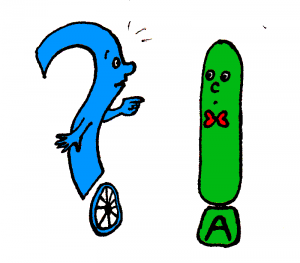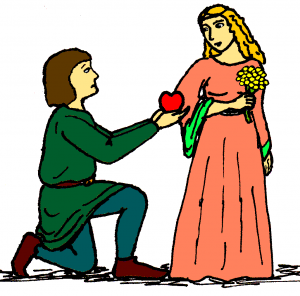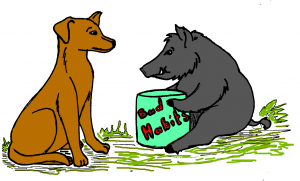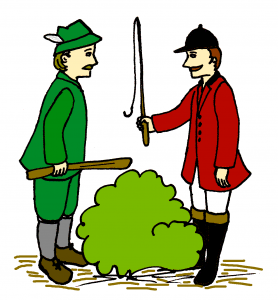Some written works influence language more than others. While Shakespearean phrases permeate the English language, Goethe’s creations provide ample source material for German idioms (see tricky questions). One major source both German and English have in common is the Bible. Then there are the various fairy tales, which sometimes overlap. Other times, sources become conflated. Let’s take the English phrase “the wolf in sheep’s clothing” and its German equivalent “der Wolf im Schafspelz.” According to the New Testament, Jesus warns the people against false prophets who appear in sheep’s clothing, but turn out to be ravenous wolves (Matthew 7:15). Then the brothers Grimm gave the wolf in sheep’s clothing a fairy tale treatment, from which the German language picked up another saying:
Kreide fressen (literally: to feed on chalk)
It derives from the Grimm brothers’ fairy tale, The Wolf and the seven young goats, which arguably belongs to the lesser known tales. In this story, the mother goat has to leave her seven young kids alone at home for a few hours. As she goes she warns them to keep doors and windows shut, so they are safe from the big bad wolf. To make sure she gets back in upon her return, they are to recognize her by her white feet and soft voice. The clever wolf, however, seizes the opportunity and pretends to be her by whitening one of his paws with flour and eating some chalk to soften his voice. The young goats are deceived, let them in, and six get eaten. The seventh one lives to tell the tale and so –this being a fairy tale – the goats are eventually saved while the wolf falls into a deep well and drowns.
If Germans say that someone is feeding on chalk, they point to that person’s sudden or surprising change of tone from hostile to mild and peaceful. Because the idiom is irrevocably associated with the fairy tale and the unsavory fate of the young goats, the idiom always has a negative connotation. You don’t believe that person and expect her to show her true colors as soon as she has achieved her goal.
Not surprisingly, many translations link the saying to hypocrisy, but it doesn’t quite fit. Of course, hypocrites pretend to be better, nobler or more sincere than they truly are. Yet, hypocrisy is invariably connected to moral or religious beliefs: hypocrites secure their standing in society by dissimulating their real inclinations. Often enough, they even criticize others about actions or thoughts that they themselves engage in. The wolf, on the other hand, does not pretend to be better than he is to fit in: he simply uses a temporary disguise as a means to an end, namely to feed on the goats. Similarly, a person who eats chalk tries to temporarily appear harmless or approachable only in order to get something.
With this in mind, it also becomes obvious that “Kreide fressen” cannot be translated with the English idiom “to eat humble pie” as the latter goes into the opposite direction: Someone who eats humble pie knows he has been wrong, but now needs an extra serving of humility to admit it.
“To eat humble pie” rather corresponds to the German saying “zu Kreuze kriechen” (literally: to crawl towards the Cross), an idiom that references the medieval custom of Christian sinners to show their repentance by crawling on their knees toward the Cross. Both the English and the German saying imply the person’s initial resistance to admit her error, which makes it so humiliating for her to finally ask for forgiveness.


 Linguistically, however, the expression works the same way as the German one: Creating an illusory distance between first name Pontius and last name Pilate does not change the fact that we are still talking about one person only. Anything in-between is of no consequence. The English idiom achieves the same effect by using
Linguistically, however, the expression works the same way as the German one: Creating an illusory distance between first name Pontius and last name Pilate does not change the fact that we are still talking about one person only. Anything in-between is of no consequence. The English idiom achieves the same effect by using  “Von Pontius zu Pilatus laufen” cannot be translated as “to get the runaround”: Although this expression also conveys that you are given wrong information or false excuses, that your question is evaded, or that your request is unnecessarily delayed, it refers to a mental action during which you remain stationary. In contrast, the German idiom refers to physically moving around.
“Von Pontius zu Pilatus laufen” cannot be translated as “to get the runaround”: Although this expression also conveys that you are given wrong information or false excuses, that your question is evaded, or that your request is unnecessarily delayed, it refers to a mental action during which you remain stationary. In contrast, the German idiom refers to physically moving around.
 (Eine deutsche Erörterung des Themas befindet sich
(Eine deutsche Erörterung des Themas befindet sich 


 Because their deaths was preceded by much eye-rolling, which gave them a somewhat surprised look, the expression initially described a stunned or startled expression. Yet, over time, the meaning changed. Today, looking “like a duck in a thunderstorm” stands for being forlorn or sorry for oneself.
Because their deaths was preceded by much eye-rolling, which gave them a somewhat surprised look, the expression initially described a stunned or startled expression. Yet, over time, the meaning changed. Today, looking “like a duck in a thunderstorm” stands for being forlorn or sorry for oneself.